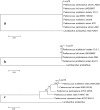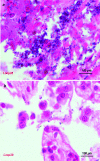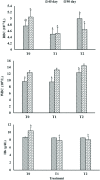Selection and characterization of probiotic lactic acid bacteria and its impact on growth, nutrient digestibility, health and antioxidant status in weaned piglets
- PMID: 29518093
- PMCID: PMC5843174
- DOI: 10.1371/journal.pone.0192978
Selection and characterization of probiotic lactic acid bacteria and its impact on growth, nutrient digestibility, health and antioxidant status in weaned piglets
Abstract
The present study was aimed to develop an effective probiotic lactic acid bacteria (LAB) from piglet feces and in vitro characterization of probiotic properties. To confirm host-species specificity of probiotics, the efficacy of isolated LAB on growth, nutrient utilization, health and antioxidant status was observed in early weaned piglets. A total of 30 LAB were isolated from feces of five healthy piglets (28d old). All isolates were Gram positive, cocco-bacilli and catalase negative. Out of thirty LAB isolates, twenty were shortlisted on the basis of their tolerance to pH (3.0, 4.0, 7.0 and 8.0) and bile salts (0.075, 0.15, 0.3 and 1.0%). Whereas, fourteen isolates were selected for further in vitro probiotic characterization due higher (P<0.05) cell surface hydrophobicity to toluene (>45 percent). These isolates fermented twenty-seven different carbohydrates but were negative for ONPG, citrate and malonate. Also enabled to synthesize amylase, protease, lipase and phytase. They were sensitive to penicillin, azithromycin, lincomycin, clindamycin, erythromycin, cephalothin and chloramphenicol and resistant to ciprofloxacin, ofloxacin, gatifloxacin, vancomycin and co-trimoxazole. Except three isolates, all showed antagonistic activity (>60% co-culture activity) against Escherichia coli, Salmonella Enteritidis, Salmonella serotype (ser.) Typhimurium, Staphylococcus intermedius, Staph. chromogenes, Proteus mirabillis, Areomonas veonii, Bordetella bronchioseptica and Klebsialla oxytoca. The isolate Lacp28 exhibited highest tolerance to acidic pH and bile salts (up to 0.3%), phytase activity, cell surface hydrophobicity, antagonistic activity and co-culture assay (>80% growth inhibition). Host specificity of Lacp28 was further confirmed by heavy in vitro adhesion to pig intestinal epithelium cells compared to chicken. Hence, Lacp28 was selected and identified by phylogenetic analysis of 16S rRNA as Pediococcus acidilactici strain FT28 with 100% similarity (GenBank accession nos. KU837245, KU837246 and KU837247). The Pediococcus acidilactici FT28 was selected as potential probiotic candidature for in vivo efficacy in weaned pigs. Thirty-six crossbred piglets (28d) were randomly distributed into three groups (four replicates of three each) namely, basal diet without probiotics (T0) or with Lactobacillus acidophilus NCDC15 (conventional dairy-specific probiotic; T1) or Pediococcus acidilactici FT28 (swine-specific probiotic; T2). At end of the experiment, six piglets of similar body weight were selected to conduct digestion trial for estimation of nutrient digestibility. Results of the study indicated that supplementation of both probiotics improved (P<0.001) FCR compared to control without significant effect in average daily gain and DM intake. However, the apparent digestibility of crude protein and ether extract was better (P<0.01) in pigs fed P. acidilactici FT28 compared control and L. acidophilus fed groups. The total WBC and RBC count, serum glucose, total protein, albumin and globulin concentration was higher (P<0.05) in P. acidilactici FT28 fed group with better (P<0.05) catalase and superoxide dismutase activity measured in erythrocyte. It is concluded that species-specific Pediococcus acidilactici FT28 isolated with potential in vitro probiotic properties and also hold probiotic candidature by showing the potential capabilities with higher nutrient digestibility, heamato-biochemical and antioxidant status compared to control and Lactobacillus acidophilus NCDC15.
Conflict of interest statement
Figures





References
-
- Smith AL, Stalder KJ, Serenius TV, Baas TI, Mabry JW. Effect of weaning age on nursery pig and sow reproductive performance. J. Swine Health Prod. 2008; 16, 131–137.
-
- Jin LZ, Ho YW, Abdullah N, Jalaludin S. Growth performance, intestinal microbial populations and serum cholesterol of broilers fed diets containing Lactobacillus cultures. Poult. Sci. 1998; 77, 1259–1265. doi: 10.1093/ps/77.9.1259 - DOI - PubMed
-
- FAO/WHO. Guidelines for the evaluation of probiotics in food Report of a Joint FAO/WHO Working Group on Drafting Guidelines for the Evaluation of Probiotics in Food Ontario Canada April 30 and May 1 2002; pp.1–11.
-
- Singh BR. Axone, a probiotic for pigs promotes growth rate in grower and suckling piglets of large black breed. 2013; https://www.notoare.com/index.php/11591615
-
- De Angelis, Siragusa M, Berloco S, Caputo M, Settanni L, Alfonsi L, et al. Selection of potential probiotic lactobacilli from pig feces to be used as additives in pelleted feeding. Res. Microbiol. 2006; 157, 792–801. doi: 10.1016/j.resmic.2006.05.003 - DOI - PubMed
Publication types
MeSH terms
Substances
LinkOut - more resources
Full Text Sources
Other Literature Sources
Medical
Miscellaneous

